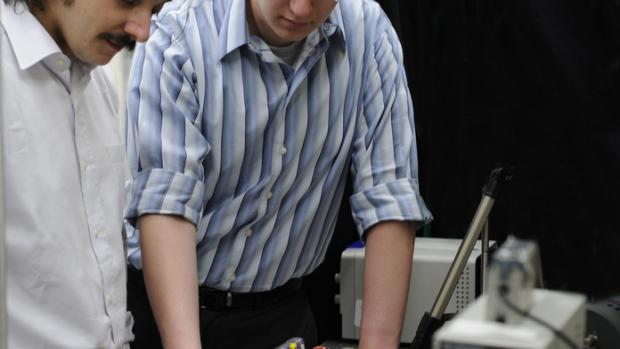National Science Foundation Awards Prestigious Fellowship to NYU-Poly Student Developing Submarine for Safe Marine Animal Interactions
Research Develops Vehicle that Responds to Bio-Feedback from Marine Creatures for Animal Training

Polytechnic Institute of New York University (NYU-Poly) student Vladislav Kopman recently received a prestigious National Science Foundation (NSF) Graduate Research Fellowship that will fund his path to a doctoral degree in mechanical engineering. NSF’s highly competitive Graduate Research Fellowship Program supports outstanding graduate students who are pursuing research-based degrees.
Recipients of the NSF’s fellowships receive a three-year annual stipend along with education allowances for tuition and fees. They are free to conduct their own research at any accredited U.S. or foreign graduate education institution. For Kopman, that will mean continuing his work in the Dynamical Systems Laboratory (DSL) at NYU-Poly directed by Dr. Maurizio Porfiri, assistant professor of mechanical engineering.
Kopman’s work takes robotics underwater by helping to develop vehicles that can interact with live aquatic creatures without causing harm to the animals. His current project is a remotely operated battery-powered submersible vehicle that is about two feet long and shaped like a torpedo. The vehicle is second generation model of a prototype developed during previous collaborations with marine biologists at the New York Aquarium and with the Wildlife Conservation Society. The vehicles interact with marine mammals and participate in training them. Videos of the aquatic robots can be seen at: http://faculty.poly.edu/~mporfiri/media.htm
The prototype vehicle can dive about 15 feet, which is the depth of the New York Aquarium’s pools. It can “swim” at a speed of around 1.5 meters per second for as long as a few hours using power from a set of onboard rechargeable nickel-metal-hydride batteries. For safety of the marine creatures, the submersible’s propulsion system is completely enclosed, and it lacks fins or other surface features that could cause harm. The propulsion system is similar to a personal watercraft, with an internal propeller forcing water through a multi-directional steerable nozzle.
During the course of his fellowship, Kopman will expand on the current underwater vehicle to allow for autonomous operation, assisted by new computer algorithms and sensors such as vision or heat-sensing devices. Kopman calls the operating strategy that will be used in the autonomous vehicle “bio-responsive control.” Future versions could operate in the ocean, mapping environments, monitoring wildlife populations or detecting water pollution, all while in the presence of marine creatures and guaranteeing their safety.
Kopman has worked since his junior year with Dr. Porfiri. Kopman’s master thesis focused on modeling a robotic fish propelled by a flapping tail similar to an actual fish’s; the robot has been used to study the behavior of so-called “gregarious” fish that swim in schools. Kopman’s undergraduate and graduate research has been supported by NSF under the CAREER award to Dr. Porfiri, the GK-12 Fellows Programs coordinated by Dr. Vikram Kapila and by NASA Space Grant Consortium. The GK-12 programs allowed Kopman to reach out to local schools by bringing science and engineering into the classroom. Part of Kopman’s NSF funding will be used to develop further outreach programs for K-12 students in underwater robotics.
About Polytechnic Institute of New York University
Polytechnic Institute of New York University (formerly Polytechnic University), an affiliate of New York University, is one of New York City’s most comprehensive schools of engineering, applied sciences, technology, and research, and is rooted in a 156-year tradition of invention, innovation, and entrepreneurship: i2e.
The institution, founded in 1854, is one of the nation’s oldest private engineering schools. In addition to its main campus at MetroTech Center in downtown Brooklyn, it offers programs at sites throughout the region and around the globe. NYU-Poly has centers in Long Island, Manhattan and Westchester County; globally, it has programs in Israel, China and will be an integral part of NYU's campus in Abu Dhabi opening in autumn 2010.

